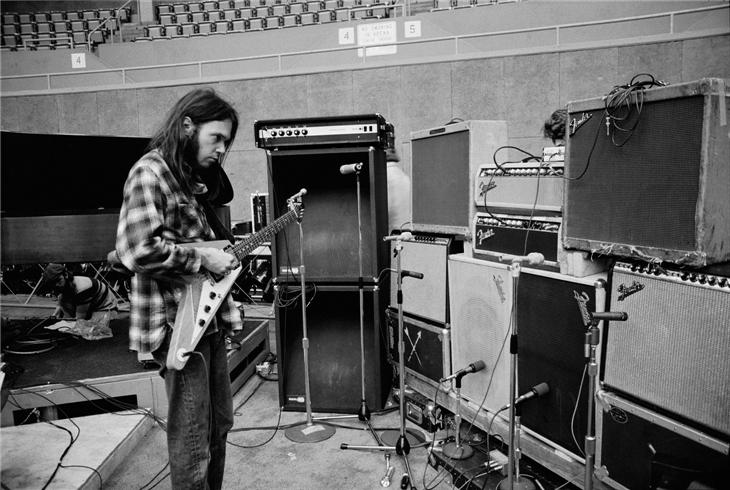Neil Young and The Sound Of Music The most interesting thing I read today was Neil Young on the BBC. "A CD only has 15% of the data that we have on the original master - the MP3 has only 5% of what we have on the original," He was talking about his new Pono player and recording with Crazy Horse. I'm not sure if he's technically correct or not, but I listen to his recordings and I believe he's really getting at a larger truth. As we get older it becomes more clear that the recorded music is not the whole story, for all its fidelity it is just a shallow reflection of what the performance felt like and listening to music in a stadium watching videotrons, where the band and sound system is just working to recreate the sound of the recording is maybe even worse. I'm sure Neil Young, in his farmyard studio with Crazy Horse smelled the hay and electricity, the old friends and beer, he felt the worn down places in the wood between the frets on his guitar that he calls "Old Black" and when they played the songs he heard much more than ever could be conveyed on the recording. It's a frustration. It's vexing. In modern music, production and machines and overdubbing and all manner of sorcery are used to amp up the sounds to make them reflect that feeling of performance that the artists are trying to convey. But they're not the same as the real thing, and Neil Young has made a career of not resorting to those kinds of parlor tricks. He's kind of a musical keeper of the faith. See Neil Young teach Meryl Streep all he knows about guitars "The guitar is doing it", he says. He's open I think. He's tried the studio wizardry and the resulting, which can be heard on a few records have left him and his fans cold. So he's left with his recordings. And after a lifetime of working and recording, a bit of disclaimer: the sound of the recording is not what he felt... not what he meant. I think in the end the only way to really share music is through performance. Not many of us will get to jam with Neil Young, but sharing the experience of musical performance is the only way to really hear music as the artist/performer understands it and experiences it. Knowing music through performance or dance is a lot different than passively listening. That's why I think it is so interesting to watch Jimmy Falon and friends perform "Call me Maybe" and other pop songs of the day on instruments we all have access to. It's a great reminder that music isn't out of reach. It doesn't require computers or lots of money. Just a will to be part of the performance. Other things may make you feel a match for life but it really only takes one thing to succeed. It takes effort. It's only in the last few hundred years in the west that audience and performer have been so formally separated in music. The music business and all its middle men depend on sustaining this separation between audience, performer and creator of music. It's a money and numbers game. But it loses something about music, no matter how high the fidelity of the recording. Music is a shared human experience that everyone could be included in. For all the digital accomplishments of the world I've never mistaken recorded music for live. No mater how big and loud the sound system, if I hear music or just a human voice, I can tell, most times pretty much instantly, if it's live or recorded. It's difficult for sound science to explain what's missing exactly and Neil Young is at the centre of the struggle to understand that because it matters to some people as an issue of more than science - something of the heart. I wonder, as the pendulum swings in music, if once we've explored the extremes of computer-based music and mechanical sounds, if we might go back and explore together simply sharing music made, and revel in its fragile structure and how all our faults, foibles and weaknesses can connect together in singing and playing. Wouldn't that be nice? (he sort of sang in a high shakey voice) |
John Wesley
Writing about life, citizenship, and Nova Scotia. Archives
June 2020
Categories
All
|

 RSS Feed
RSS Feed